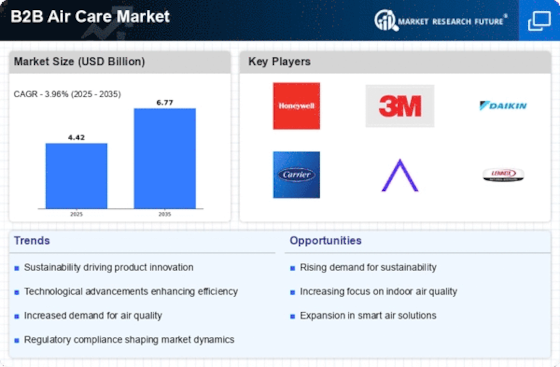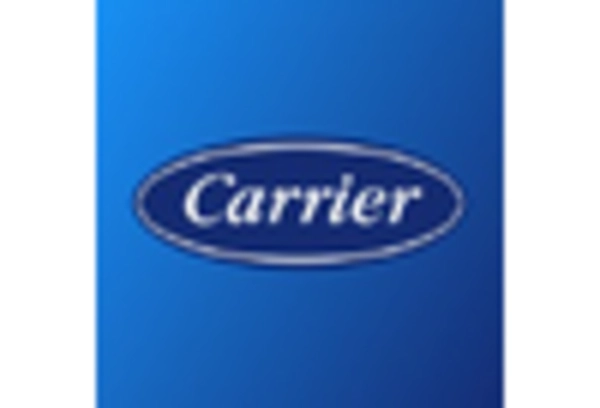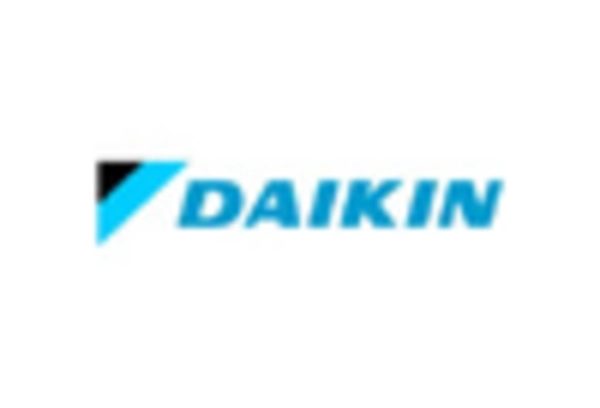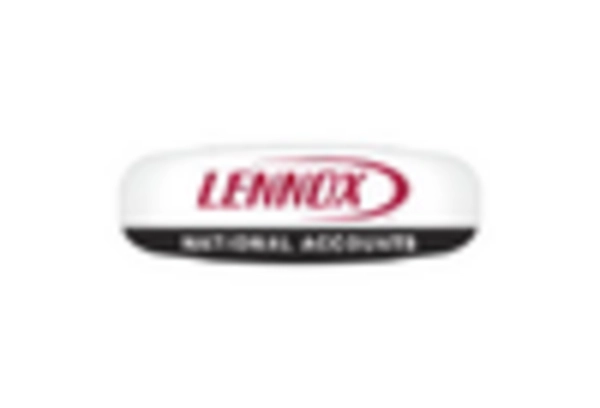Increased Regulatory Compliance
The B2B Air Care Market is being influenced by heightened regulatory compliance regarding air quality. Governments and health organizations are implementing stricter regulations to ensure safe indoor environments, particularly in sectors such as healthcare, education, and hospitality. Compliance with these regulations often necessitates the adoption of advanced air care solutions, which can be costly but essential for maintaining operational licenses. For instance, businesses that fail to meet air quality standards may face penalties or operational shutdowns. This regulatory landscape is driving demand for air care products and services, as companies strive to adhere to legal requirements while ensuring the well-being of their employees and customers. Consequently, the B2B Air Care Market is likely to see sustained growth as compliance becomes a priority for businesses.
Technological Advancements in Air Care
Technological advancements are significantly shaping the B2B Air Care Market. Innovations such as air purifiers equipped with HEPA filters and UV-C light technology are becoming increasingly prevalent. These technologies not only enhance air quality but also provide businesses with efficient and cost-effective solutions. The market for smart air care devices is projected to grow at a compound annual growth rate of 12% over the next five years. This growth is attributed to the integration of IoT capabilities, allowing businesses to monitor air quality in real-time and make data-driven decisions. As companies seek to optimize their operations, the adoption of advanced air care technologies is likely to accelerate, further propelling the B2B Air Care Market.
Rising Demand for Air Quality Solutions
The B2B Air Care Market is experiencing a notable increase in demand for air quality solutions. Businesses are becoming increasingly aware of the impact of indoor air quality on employee health and productivity. According to recent data, organizations that invest in air care solutions report a 20% increase in employee satisfaction and a 15% reduction in absenteeism. This trend is likely to continue as more companies recognize the importance of maintaining a healthy work environment. Furthermore, regulatory bodies are imposing stricter guidelines regarding air quality standards, compelling businesses to adopt advanced air care technologies. As a result, the B2B Air Care Market is poised for growth, driven by the need for effective air quality management solutions.
Growing Awareness of Health and Wellness
There is a growing awareness of health and wellness among businesses, which is significantly impacting the B2B Air Care Market. Companies are increasingly recognizing the correlation between air quality and overall employee health. Research indicates that poor indoor air quality can lead to respiratory issues and decreased cognitive function, which can ultimately affect productivity. As a result, businesses are investing in air care solutions to create healthier work environments. This trend is particularly evident in sectors such as corporate offices and educational institutions, where the focus on employee and student well-being is paramount. The B2B Air Care Market is likely to benefit from this heightened awareness, as organizations prioritize air quality as a key component of their health and wellness strategies.
Sustainability Initiatives in Business Practices
Sustainability initiatives are becoming increasingly integral to business practices, influencing the B2B Air Care Market. Companies are seeking eco-friendly air care solutions that not only improve air quality but also align with their sustainability goals. The demand for products that utilize sustainable materials and energy-efficient technologies is on the rise. According to industry reports, the market for green air care solutions is expected to grow by 10% annually as businesses strive to reduce their carbon footprint. This shift towards sustainability is prompting manufacturers to innovate and develop products that meet these criteria. As organizations continue to prioritize environmental responsibility, the B2B Air Care Market is likely to see a surge in demand for sustainable air care solutions.

















Leave a Comment